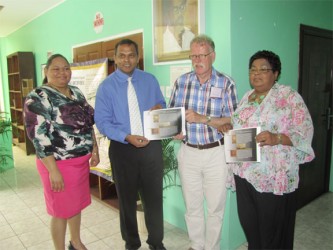The digitisation of the Walter Rodney Archives has commenced with trained archivists utilising the recently revamped digital camera and scanning tray, under a $10 million project funded jointly by the Ministry of Culture, Youth and Sport and UNESCO, with $5.2 million going directly to equipment upgrades.
Speaking at a press conference at the archives building on Homestretch Avenue, Secretary General for UNESCO Inge Nathoo said that training and equipment upgrade were to become a part of the archiving process in Guyana. She noted that it was imperative for curators and archivists in Guyana to be equipped with the knowledge instead of depending on external experts. She said that when experts visit from the international community, the goal was to have staff incorporate those new skills.
Adam Wright of Icam Archive Systems, Northamptonshire, UK spent time in Guyana refurbishing the old analog camera which the government had purchased in 1997, into a digital camera. He said a new system would have cost at least $7.2 million for the camera and scanning tray, but that the equipment already at the Walter Rodney Archives was in great condition. “I was pleasantly surprised at the state of camera and the amount of work it would need,” Wright told Stabroek News. He said the trip to Guyana had been incredibly successful and staff could use the refurbished equipment to scan items as large as newspapers. Larger documents, such as old maps may have to be scanned in pieces, but the software has the capability to provide seamless integration once the document goes digital, he added.

Culture Minister Dr Frank Anthony said Guyana’s focus had to be on preservation of the archives. He said the digitisation was moving towards sustainability by taking the project online and making documents accessible around the world. Dr Anthony said historians having access globally and paying a fee for hard copies would see Guyana as a small developing country being able to continue to finance historical preservation.
He noted that in the past Guyana’s climate and the way documents were stored had resulted in significant damage being done. Anthony said the refurbished equipment was being used for print documents, but the Walter Rodney Archives would also be addressing how to preserve audio and film footage, which are also in a poor state.
Anthony said too that archiving was still in need of assistance in relation to translating various documents. For the next five weeks, Director of the Mutual Cultural Heritage Programme of the National Archives of the Netherlands Roelof Hol will be assisting with the organisation of the third largest collection of archives dealing with the Dutch West Indies Company. He said that digitisation and translation were imperative to the sharing of information.
According to Director of the Walter Rodney Archives Nadia Gamel-Carter, the digitisation of immigration documents will be finished in the next six months and the staff will move on to other documents. She noted that the acquisition of a generator would be a request in 2014 to better preserve documents in cases of prolonged blackouts.





